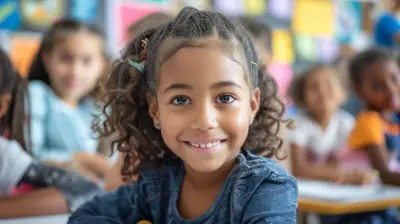Differentiating for Gifted Learners: Challenges and Strategies
17 July 2025
Have you ever had that one student who zooms through assignments, always raises their hand first, and seems to have a thousand “what if?” questions about every topic? Yep, that’s probably a gifted learner — and while it may seem like a walk in the park teaching them, it’s actually quite the balancing act.
In classrooms that are bursting with diversity — in personalities, backgrounds, and learning styles — tailoring instruction to meet the needs of everyone is already a challenge. But when it comes to gifted learners, the puzzle gets even trickier. These students often need more — more depth, more complexity, more speed — and if they don't get it, boredom and frustration can quickly set in.
Let’s dive deeper into what sets gifted learners apart, the hurdles teachers face when trying to differentiate instruction for them, and some tried-and-true strategies that actually work. Ready? Let’s go!
Who Are Gifted Learners, Anyway?
Before we jump into the nitty-gritty of differentiation, let’s clear up what we mean by "gifted." It’s not just about high grades or being the teacher’s pet (although that sometimes happens). Gifted learners show advanced abilities in one or more areas — think math, science, music, language, or even leadership and creativity.These students often exhibit:
- Rapid learning and an ability to grasp concepts quickly
- A knack for critical thinking and problem-solving
- A vivid imagination or unique way of viewing the world
- Intense curiosity — they ask tons of questions!
- A strong memory — they recall things you might’ve forgotten years ago
Simple enough, right? But here’s the catch: just because a student is gifted doesn’t mean they’ll automatically thrive in school. In fact, many gifted learners struggle to stay engaged in traditional classrooms.
The Challenges of Differentiating for Gifted Learners
Let’s be real: differentiation isn’t easy. It requires planning, flexibility, and a solid understanding of your students. And when it comes to gifted learners, the stakes are even higher.1. One Size Never Fits All
Gifted learners aren’t a single group — they’re individuals with different strengths, passions, and learning styles. Some love reading Shakespeare while others are obsessed with coding or building robots. So you can’t just toss them all into a “smart kids” group and call it a day.2. Time is Always Tight
Teachers are juggling a million things — lesson plans, grading, meetings, parent communication — you name it. Carving out time to create individualized plans? Not easy.3. Lack of Resources and Training
Let’s be honest, many educators don’t get specialized training in gifted education. And not every school has access to the materials or programs needed to challenge these learners. It’s like trying to cook a gourmet meal with only a microwave.4. Balancing the Whole Classroom
When you’re trying to meet the needs of gifted learners, struggling students, English language learners, and everyone in between, things can feel like a circus act. It’s all about balance — and sometimes that balance seems impossible to achieve.
Why Differentiation is Worth It
You might be thinking, “Is all this effort really necessary?” In short — absolutely!Gifted learners who aren’t challenged often become disengaged. They might start acting out, zoning out, or simply stop trying. It’s not because they’re lazy — it’s because they’re bored.
On the flip side, when gifted students are given meaningful challenges, they shine. They develop perseverance, creativity, empathy, and leadership skills. Win-win, right?
Strategies That Actually Work — Without Driving You Insane
Okay, now let’s get into the good stuff. As challenging as it can be, differentiating for gifted learners is totally doable. The key is to work smarter, not harder. Here are some practical strategies that you can actually start using tomorrow.1. Pre-Assessment is Your Secret Weapon
Start by figuring out what your students already know. A quick pre-test or informal quiz can go a long way. If a gifted student has already mastered the material, why make them sit through it again?Let them skip the basics and dive into more advanced or related topics. It’ll keep them engaged, and they’ll thank you for not wasting their time.
2. Compacting the Curriculum
This one’s a game-changer. Curriculum compacting means streamlining lessons by cutting out content a student has already mastered. For example, if a student nails the first few lessons in math, let them skip ahead or work on enrichment projects.Think of it like clearing the runway so they can take off and fly.
3. Tiered Assignments
Tiered assignments are a fabulous way to give all students the same core task but at varying levels of complexity. Everyone gets the same topic — say, the causes of climate change — but your gifted learner might explore it through a scientific research paper or data analysis, while others summarize a video.It’s all about providing the right level of challenge based on readiness.
4. Encourage Independent Projects
Gifted students often have passions that go way beyond the curriculum. So let them run with it!Independent study projects allow them to deep-dive into a subject they're excited about — from building a model rocket to writing a novella about time travel. Give them some guidance, set expectations, then stand back and watch the magic happen.
5. Incorporate Choice — Always
Here’s a simple trick that works wonders: offer choices.Let students pick how they show what they've learned — maybe a poster, podcast, video, or dramatic skit. When gifted learners have a say in their learning, they’re more likely to take ownership and go above and beyond.
6. Use Real-World Problems
Gifted learners thrive on relevance. Throw them into real-world scenarios where they must think critically, negotiate, and innovate.Challenge them to design a sustainable city, create a marketing plan for a local business, or solve fictional problems in space travel. These kinds of tasks stretch their minds and spark their creativity.
7. Promote Peer Teaching and Leadership
Let gifted learners mentor or support classmates. It builds empathy, strengthens their understanding, and boosts classroom community. Just make sure it feels like an opportunity — not more work.8. Flexibility is Key
Differentiation isn’t set in stone. Be open to adjusting your plans based on what’s working and what’s not. And don’t be afraid to ask your gifted learners what they need. Often, they know exactly what will help them stay engaged — they just need you to listen.A Word on Social-Emotional Needs
It’s easy to focus only on the academic side, but gifted learners often struggle emotionally, too. They may feel isolated, misunderstood, or pressured to be perfect.Make space for open discussions about anxiety, friendships, and self-worth. Encourage a growth mindset and let them know it’s okay to fail. After all, that’s how we grow.
Partnering With Parents
Parents of gifted kids are your allies. They often have great insights into their child's interests, struggles, and quirks. So keep the lines of communication open.Share what you’re doing in the classroom and invite them to contribute ideas, resources, or even guest speaker opportunities. Building this partnership can make a huge difference.
Final Thoughts
Differentiating for gifted learners is like adjusting the sails on a boat. It takes awareness, effort, and a willingness to shift course when needed. But when done right, it can create a classroom that’s not just inclusive, but inspiring.Remember, gifted learners aren’t looking for “more work.” They’re looking for meaningful work. So let’s challenge them, support them, and cheer them on as they push the boundaries of what’s possible — because trust me, they will.
So, next time you see that bright spark in a student’s eyes, light the fire. Nurture that brilliance. Be the teacher who saw their potential and helped them soar.
all images in this post were generated using AI tools
Category:
Differentiated InstructionAuthor:

Olivia Chapman
Discussion
rate this article
1 comments
Zevin Nguyen
Great insights! Tailoring strategies is crucial for nurturing gifted learners effectively.
July 26, 2025 at 3:44 AM

Olivia Chapman
Thank you! I completely agree—tailoring strategies is essential for meeting the unique needs of gifted learners.


